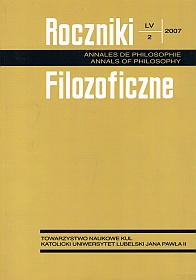Some Controversies around Technological Rationality in S. Lem’s Dialogues
Abstract
Technological rationality seeks to overcome the neutrality, or even strangeness, of the surrounding world by the appropriation of things, by which they obey man. The world ceases to be raw nature, and it appears to us as emanation, projection of human wishes and sensitivity. A special stress is laid here on technological and cybernetic values. They become values in themselves. All efforts are directed towards putting ambitious cybernetic plans into practice. Consequently, the quality of human life seems to lose its importance. This because, to paraphrase Kotarbiński’s idea, man has diverged the main road, the road of relatively simple things, and has entered the bog of basic problems. For the activity of technological rationality and for its effectiveness it seems indifferent whether the goal is worthy, or whether is contradicts any ethical sense. From now on all efforts and activity, which once determined means to an end, become the end itself in the era of cybernetic megamachine. This type of rationality rather seeks to be deprived of ethical signs, which could appease all sorrows and human frustrations.
References
Baudrillard J.: Symulakry i symulacja. Warszawa: Wyd. „Sic” 2005.
Broch H.: Lunatycy. Wrocław: WD 2005.
Faulkner W.: Przypowieść. Poznań: WR 2002.
Fromm E.: Anatomia ludzkiej destrukcyjności. Poznań: WR 2005.
Jarzębski J.: Lata młodzieńcze i dojrzałość cybernetyki, [w:] S. Lem, Dialogi, Kraków: Wyd. Literackie 2001.
Lem S.: Dialogi. Kraków: Wyd. Literackie 2001.
Opoczyńska M.: Róża wierszem niezawołana. Szkice na temat poznania i samopoznania, Kraków: Wyd. UJ 2002.
Płaza M.: O poznawaniu w twórczości Stanisława Lema, Wrocław: Fundacja Nauki Polskiej 2006.
Copyright (c) 2007 Roczniki Filozoficzne

This work is licensed under a Creative Commons Attribution-NonCommercial-NoDerivatives 4.0 International License.





